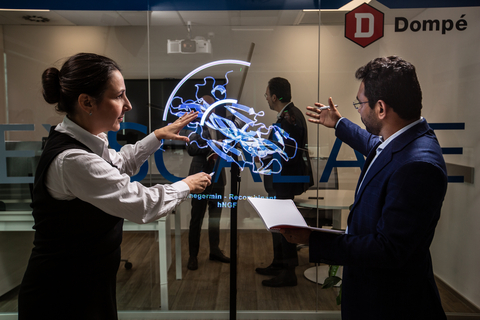
ROME– Nature Conferences has convened a meeting of leading global scientists to discuss the state of the art and future lines of research on neurotrophins. The event, From the Eye to the Brain, will focus on the potential new applications of neurotrophins in therapeutic areas including ophthalmology and the central nervous system. The program takes place in Rome June 11-12 and is sponsored by Dompé farmaceutici.
Neurotrophins were discovered by Italian Nobel laureate Dr. Rita Levi-Montalcini and her colleague Dr. Stanley Cohen in the early 1950s. Drs. Levi-Montalcini and Cohen uncovered that NGF plays a crucial role in the proliferation, differentiation and survival of sympathetic and sensory neurons.

The past decade saw a key breakthrough with the first successful therapeutic application of a neurotrophin. The first NGF treatment was approved in 2018 by the U.S. FDA for the treatment of a rare corneal disease.
From the Eye to the Brain will feature global experts in the fields of neuroscience and ophthalmology discussing the first potential therapeutic applications of neurotrophins in the treatment of optic nerve and retinal damage in glaucoma and central nervous system disorders including pediatric and adult traumatic brain injuries, Parkinson’s disease, dementia and depression.
“Research on neurotrophins is becoming increasingly important for understanding several brain diseases for which we currently have no effective therapies,” said Elliott Mufson, professor of neurobiology and Alzheimer’s disease researcher at Barrow Neurological Institute in Phoenix, Arizona, and speaker at the conference. “For example, there is a disconnect between the NGF and its receptors, which leads to the death of key neurons, causing dementia in people with Alzheimer’s disease, Parkinson’s disease, and Down syndrome. Potential approaches to rescue these neurons exist and we will discuss how NGF could be used to track the progression of Alzheimer’s Disease in people affected by the disease.”
“The discovery of neurotrophins in the 50s was a truly paradigm-shifting, revolutionary discovery. It was a brilliant piece of work that changed how we thought about our brain’s functions.” said Thomas Südhof, M.D., Nobel Prize in Physiology or Medicine 2013. “Today neurotrophins are under-researched but there are enormous opportunities. These opportunities will be realized once we actually have a better insight into what neurotrophins do.”

